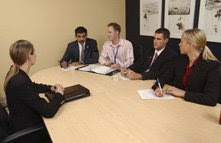
A group Interview is all the tougher because here you need to compete with others thus proving you better than others. Among the many questions asked during the interview, few of them are as below:
What made this team work successfully?
What was your personal contribution to the team's performance?
Why did this team struggle to accomplish the objective?
How did you deal with the stress created by meeting the challenges?
How would the other team members describe you?
How would you describe yourself?
How would your colleagues describe you?
What about this position appeals to you most?
What are your goals and how does this company and job fit into these goals?
Prepare for a general interview question about your suitability for the position
What would you bring to this position?
Interviewers will take note of the following points in panel interview:[/b]
How well you interact with others
How good you are at influencing and persuading others on your team
Whether you work well in group settings
How effective a communicator you are
Whether you reach decisions based on logic or on emotion
If you have good listening skills
How well you cope with stress
Decision making: Do you make decisions based on emotion, on logic or possibly on intuition?
Problem solving skills: The quality of the solution you provide, the ‘creative’ way you reach a solution and how well you cope with complex (or stressful) situations.
Negotiation skills: How well you convince and influence people with your ideas.
Communications skills and listening skills: How do you interact with people? How well do you work as a team member? How do you present a solution?
Leadership and management capacities: Can you lead a team? Do you dominate a team? Are you a follower or a natural leader? Are you a ‘positive’ leader – how do others react to you when/if you delegate tasks?
Analytical skills: How do you analyze situations? How do you gather essential information before making a decision?
Things to be done before the interview:[/b]
When you introduce yourself to the team members, make your story interesting. Highlight some of your unique past achievements. Use your sense of humor, if appropriate.
Show a sincere interest when others introduce themselves.
Find the balance between dominating others and cooperating with others – you don’t want to annoy people and come across as “the clever person”, it’s a guaranteed way to get eliminated from consideration.
Don’t hesitate to be ‘the independent thinker’; you can take a contrary point of view.
Say what’s on your mind even if your opinion is in a minority position – persuade the members. However, don’t stay in opposition too long and cooperate with others.
Consult with team members.
Support good ideas coming from others.
Listen carefully to others – don’t interrupt” the conversation flow.
Ask your team and panel member’s leading questions.
If there is a disagreement, be the mediator.
Don’t try to impress – just be yourself.
Analyze risks and opportunities.
Write notes during the conversation.
Be creative – think out of the box.
Volunteer to be the team’s public speaker and state your conclusions to the interviewing panel.
Why Do Panel Interviews?[/b]
Companies conduct panel interviews for several reasons:
It is easier to bring several staff together at once to interview a single candidate than to organize individual sessions.
Panel interviews often include prospective teammates who would not be on the schedule for individual sessions.
Some HR professionals believe that the "real" person emerges when an applicant is put under the intensive interviewing stress that a panel can engender.
Because panel interviews are often conducted following the applicant's scientific presentation to the company, this is the company's opportunity to ask questions that may not be appropriate in an open seminar.
Always ask your contact at the company to give you your interviewing agenda in advance, so that you can find out whether a panel interview is involved. Don't be taken by surprise!
Remember the importance of eye contact (see sidebar). You must visually engage all interviewers, regardless of their locations in the room and their levels of seniority in the company.
Despite the fact that panel interviews are loaded in the company's favor, most firms will allow you a few minutes to ask questions of your own. Don't wing this. Make sure you have memorized a list of questions that will reflect positively on you. Try not to refer to questions you have written down; make your questions a more natural part of the conversation.
Although it is normal to be uncomfortable when being interviewed by a group, remember that you can't allow nervousness to take over. Concentrate on responding to the person who asks a question, just as you would in a personal interview with that individual. Take it one question, and one interviewer, at a time.
Always have a response ready for the "Tell us about yourself" question that often starts thing off in the panel interview. Have both a short version and a longer version, and ask the panel members how much detail they want.
